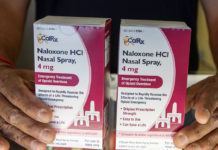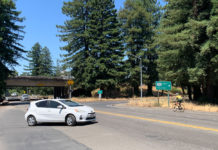Safe School Ambassadors trains junior high students for peer intervention
On Oct. 15 and 16, Healdsburg Junior High School students were trained to mediate conflict in the Safe School Ambassadors program put on by Community Matters. The training, attended by 47 students, was funded by a grant from the Healdsburg Kiwanis and organized by director of student services Bill Halliday.
“The main goal of the program is to help students prevent and stop mistreatment of other students,” said Halliday. “The effort is to empower students to be the ambassadors to the type of community we want to see on our campus, which is a campus of kindness, support and encouragement, not a climate of bullying or mistreatment.”
According to Healdsburg Junior High School principal Deborah Hall, Safe School Ambassadors teaches students to recognize bullying and mistreatment when they see it, and prepares them to intervene in some positive way. “They learn to observe what is happening and to stop and think about it,” she said. “Then they decide whether or not to take action and which action might have the best result. Most of all, they learn to stop being a bystander and to stand up for others.”
Student training involved mostly role-playing to demonstrate and practice resolving common kinds of campus conflict, according to Halliday, and also listening activities to show students how to be more active listeners. One example of possible conflict and resolution shown through role-playing included how to respond if students notice a peer being isolated, and ways they can encourage inclusion.
“We do a lot of role-playing, skits and activities to run the students through scenarios,” said Halliday. “It’s the best way to put it, so they can get a general idea of how they can be a more positive influence on their peers. One of the key words is balancing…like if someone’s being put down, how could you balance that with a put up…how can you support a student by showing you care.”
According to Halliday, the adults responsible for coaching Safe School Ambassador students are called family group leaders, and include many volunteers from the Healdsburg Junior High school staff.
Jennifer Gilliam, a teaching assistant at the junior high and one of the family group leaders, joined the Safe School Ambassadors program because she wanted to help students problem-solve on the playground, to show them how they can help stop bullying in the locker rooms, and to encourage them to be kind to other kids who maybe don’t have as many friends.
“I’ve been at the campus the last five years and I’ve seen less fights, and more kids problem-solving for themselves,” said Gilliam. “They’re sitting down, working it out, talking it out…it’s a safer place for kids.”
Gilliam believes that the Safe School Ambassadors program helps teach students how to get along with one another on their own, without adult intervention, and encourages them to step outside their own social group. “Everybody is just like one now,” she said. “There’re no certain little cliques…everyone is friends with everybody.”
“Fighting and bullying have declined significantly,” said principal Hall. “Many of our students show no hesitation when they need to take action and diffuse a situation. Overall our students are treating each other with more respect.”
Halliday explained that in some cases, peer intervention is more effective than intervention from adults, because students in junior high are going through that transition phase from looking up to adult models to their peers having the most influence over how they behave. It starts at the junior high level and goes on through the high school, he said.
“They listen to their friends,” said Halliday. “We had a case of a student taking something from another student, and one of our ambassadors intervened and got the item returned, and got apologies and settled the entire issue. It was remarkable, one of the best interventions I’ve seen…that’s a good example of where sometimes peer intervention is more effective than adult.”
67.8
F
Healdsburg
July 10, 2025








